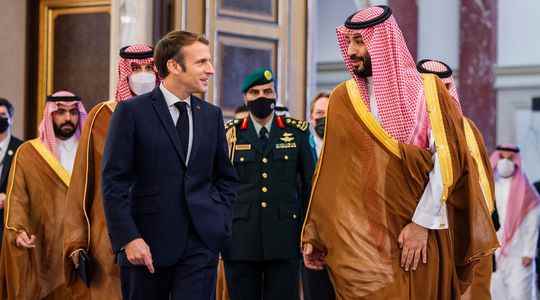Emmanuel Macron receives this Thursday, July 28 for dinner the Saudi Crown Prince Mohammed bin Salman, whose this is the first visit to Europe since the assassination of the Saudi journalist Jamal Khashoggi, despite the strong anger of human rights defenders . This meeting is a further sign of the “rehabilitation” of the de facto leader of the kingdom, less than two weeks after the visit of US President Joe Biden to Saudi Arabia, which consecrated the return of “MBS” on the international scene, in a context war in Ukraine and soaring energy prices. Interview with David Rigoulet-Roze, associate researcher at the Institute of International and Strategic Relations, specialist in the Middle East.
L’Express: What is Mohammed bin Salman doing in Europe?
David Rigoulet-Roze: It’s a mini tour, with the emblematic formula expressed by the prince upon his arrival on the European continent, the promise of “much cheaper energy” for Europeans. Mohammed bin Salman began his journey in Greece, an important step because an electric cable linking the country to Saudi Arabia is to be installed there in the coming months. Other projects are underway, with the underlying idea of transforming Greece into a sort of hub between Europe and the Middle East on energy issues. Mohammed ben Salmane is also taking advantage of the Europeans’ oil supply difficulties to try to rehabilitate his image and attract investment as part of his “Vision 2030” project.
A dinner with Macron, a visit to Europe, a “check” with American President Joe Biden, Mohammed ben Salmane was it not infrequent since the assassination of journalist Jamal Khashoggi?
He was. He was also not received like his counterpart Mohamed ben Zayed, the president of the United Arab Emirates, to whom Paris rolled out the red carpet on July 17, 2022. A lot of communication was made around a strategic relationship privileged with Abu Dhabi. On the contrary, a sign of a certain malaise, the Élysée announced Bin Salman’s visit at the last moment and took care to qualify this meeting as a “working visit” and not a “State visit”, so as not to give the impression of openly rehabilitating the crown prince.
The executive wants to avoid a certain media hype, which has already started with a complaint filed by two NGOs (Democracy for the Arab World Now and Trial International) against MBS, considered to be complicit “in the torture and forced disappearance of Khashoggi”. . The fiancée of the murdered journalist and part of the French opposition, in particular elected EELV, also said they were scandalized. But just like Joe Biden or Recep Tayyip Erdogan, Emmanuel Macron cannot bring himself to run out of energy for the winter or to pay too much for it, which would amount to depriving part of the French of transport and heating. It is not strictly speaking benevolence or indulgence, rather a form of realpolitik which is imposed on everyone.
This is not the first time that Macron has spoken with MBS since the assassination of Khashoggi. He met him last December in Jeddah. Is France likely to obtain more oil from Saudi Arabia, with these multiple diplomatic meetings?
At the time of this first meeting, the embargo on Russian oil had not been established. According to the Élysée, Emmanuel Macron had notably addressed the Lebanese financial situation. Historically close, the Saudi Arabia of MBS had moved away from Lebanon, while Beirut was plunged into economic chaos. Emmanuel Macron then came to try to secure the financial support of Ryad, at the bedside of Lebanon.
Today, the main issue for the French as for the Europeans is obviously oil. By warming up its relations with the oil monarchies and Saudi Arabia, the West is trying to make up for the Russian oil deficit and the inflationary rise in energy prices. An encouraging sign, Saudi Aramco, the largest oil company in the world, has already partially responded to European demands. It has redirected flows of hydrocarbons initially intended for Asia in general and China in particular for the benefit of Europe, particularly since the summer. This is a way of guaranteeing the old continent privileged access to hydrocarbons from the golf course, while the kingdom of black gold remains the world’s leading exporter of crude oil, with more than 6 million barrels per day.
OPEC+ has also agreed to increase its production to the West, by a total of 650,000 additional barrels per day to fill the market from July and August. This is not likely to profoundly change the fundamentals of the oil market, but to temporarily limit inflationary pressure on prices. It is presented as a sign of goodwill shown by Ryad, to respond to repeated Western requests.
Can Emmanuel Macron both demand oil and stand firm on human rights disagreements with Saudi Arabia, as Prime Minister Elisabeth Borne has announced?
France can talk about human rights considered to be violated in Saudi Arabia, but it is always difficult to impose conditions when you are subject to immediate imperatives, in this case energy. As to whether MBS can be inclined to progress, the situation is complex and ambivalent. Because if Saudi Arabia is liberalizing economically, even societally (right to drive for women, bringing the religious police into line, etc.) by betting on integrating women and young people more into the market work, an imperative for Vision 2030, this liberalization does not go hand in hand with political liberalization, within the framework of autocratic governance.
